- Home
- Sherry Thomas
Beguiling the Beauty ft-1 Page 3
Beguiling the Beauty ft-1 Read online
Page 3
But Helena would play along, as she’d played along since Venetia unexpectedly turned up at Huntington. “All right, then, but only for you, and only because you are getting on in years and soon will only have gentlemen callers when they mistake your door for their grandmother’s.”
Venetia laughed, spectacularly beautiful. “Piffle. Twenty-nine isn’t that old—yet. But it’s true I might not have another chance of becoming a duchess if this one goes by. So you’d better have a proper hat.”
“I will allow you to select one for me that looks like a carnival.”
Venetia placed her arm around Helena. “Wouldn’t it be marvelous if you met the perfect man this Season and accepted his proposal? Then we could have a double wedding.”
I’ve already met the perfect man. I won’t marry anyone else.
Helena smiled. “Yes, wouldn’t it?”
CHAPTER 2
She was dressing—buttoning her combination, pulling on her stockings, stepping into her petticoat, her motions unhurried, dancerlike. Her back was to him, but the vanity mirror provided an unobstructed view of the rest of her. He remained in bed, his head propped up on his palm, and watched the ripple and sway of her dark, unbound hair.
Outside, a woodpecker tapped diligently. Inside, the late afternoon sun receded from the room, the wedge of dappled, coppery light on the ceiling growing ever more indistinct. Her twilit beauty was less precise—as if she had been turned into an Impressionist painting, brushstrokes of color and shadow. He could look at her without feeling as if he must shield his eyes or risk damaging them.
He reached out, took a loose curl of her hair, and wound it about his fingers, bringing her closer to him.
She acquiesced easily, sitting down at the edge of the bed and looping an arm around his shoulders. “Haven’t you had enough of me?” she asked, smirking.
“Never.”
“Well, no more for you now, sir—I must summon my maid. And why aren’t you getting ready?”
He stroked the inside of her elbow. “I’ll start in another quarter hour. Meanwhile I’ll use you to help me pass the time.”
She laughed and slipped away from his grasp. “Later. After the ball—maybe.”
The woodpecker struck ever louder.
Christian bolted upright in his bed. The room was dim, its recesses murky; the fire in the grate had burned down to embers. There was no one with him, beautiful or otherwise. It was the morning of his Harvard lecture and someone was knocking at his door.
“Come in,” he said.
Parks, his valet, entered. “Good morning, Your Grace.”
“Morning,” he said, flinging aside the covers and getting out of bed.
The dream, which he’d never experienced before, had been so real. He could have described the translucent muslin curtain on the window, the stylized vines of the Oriental carpet on which she’d stood, the exact length and texture of her hair.
But it was not the intensity of the details that had disoriented him—after some of his more prurient dreams, he could have drawn her with great anatomical precision. Rather, it was the affectionate domesticity, the easy intimacy and sweetness.
“Sir,” said Parks. “Your water grows cold. Shall I fetch you another basin?”
How long had Christian been standing before the washstand, daydreaming, the way a petty thief might yearn toward the vault beneath the Bank of England?
Another five years had passed since he last saw Mrs. Easterbrook, outside the British Museum of Natural History. Some days he sincerely believed he’d outgrown his adolescent obsession. On one such day he’d promised his stepmother that after the lectures at Harvard and Princeton, he’d be in London for the entire Season—to do his duty and find a wife.
Mrs. Easterbrook, who had an unwed sister, was certain to be in London. As the latter’s chaperone she’d frequent many of the same occasions he’d be expected to attend. They might be introduced. There could even be occasions when, for civility’s sake, he must speak to her.
“Your Grace?” Parks asked again.
Christian stepped aside from the washbasin. “Do as you see fit.”
She looks stunning, does she not?” Venetia asked Millie.
For the occasion of the duke’s lecture, Helena had donned a promenade gown of deep green velvet. Bridget, Millie’s maid, hovered behind Helena, making sure the drapes of the skirt fell just right.
“She is a vision,” Millie readily agreed. “I love a redhead in green.”
Venetia turned to Millie. “And may I add that you, too, look very well.” The mustard color of Millie’s dress, problematic on most women, somehow worked to her advantage, making her look fresh and unexpected. “The duke will conclude I am a devoted sister and sister-in-law and an upstanding woman. Then he will promptly ask me to curate his private museum.”
Helena shook her head. “Always the fossils.”
Venetia grinned. “Always.”
She felt more optimistic than she had reason to be. But they’d had a good time the past week, touring the backcountry of Connecticut and the pretty islands of Martha’s Vineyard and Nantucket. Helena had seemed more like her old self than she had in a while. And Venetia was hopeful that by the end of the trip, she would come to fully realize the error of her ways.
Helena was not flighty or thoughtless. In fact, she was usually an exceptionally astute judge of character.
After their first meeting with Millie, during which the latter had said not above ten words, Helena had told Venetia, Fitz is lucky. She will be a good wife to him. Millie had proved to be the best wife a man could hope for.
And, of course, there had been the memorable occasion, so many years ago, when Venetia, eagerly in love, had pressed Helena for what she thought of Tony. Helena had answered reluctantly that he seemed to “lack a certain inner strength.”
How right she had been. Which had made it twice as shocking that she, of all people, would behave in a manner that would jeopardize her entire future.
Bridget, satisfied with Helena’s dress, turned to Millie. “Will you be needing anything else, mum?”
“No, and you may have the rest of the day off.”
“Thank you, mum.”
On this trip, they’d brought only Bridget. Venetia’s maid, Hattie, suffered from terrible seasickness and had stayed behind. Helena’s maid had left service a year ago to marry and was never replaced.
Venetia had not thought much of it at that time—Helena stayed with either Venetia or Fitz and Millie and it was easy enough for Hattie or Bridget to see to her. Now she wondered whether the oversight had been deliberate on Helena’s part. Without a maid whose duties revolved entirely around her, Helena had one fewer person to keep track of her movements.
Had Helena planned her affair, clearing the obstacles one by one? Venetia did not relish the possibility.
Well, Helena could still change her mind. Perhaps the sight of a very proper, very unmarried young man was just the nudge she needed. And surely it must be providence, or the duke, who’d been as elusive as the Holy Grail for so long, would not suddenly appear at this particular juncture in their lives.
Venetia reached for her gloves. “I am ready to cast my eyes upon Lexington. Anyone else?”
They arrived half an hour early, but Sanders Theatre, the Harvard auditorium, was already packed. Only in the last row did they manage to find three seats together.
Millie glanced about. “My goodness, look at all the women in attendance.”
Helena adjusted the angle of her new, suitably opulent hat. “Not surprising when the lecturer is a young, rich duke. It looks like you will have competition, Venetia.”
“Maybe they are just curious,” said Venetia breezily. “With so many of their grand heiresses marrying our penniless lords, they must be dying to see what an Englishman who doesn’t need money looks like.”
“You’ve never seen one of those, either, right, Millie?” Helena teased.
“Not in my marriage I have not.
” Millie chortled.
“At least your poor English peer is handsome,” said Venetia.
“That he is, handsomer than Apollo.”
The compliment toward her husband was uttered with perfect matter-of-factness, not a single flutter to her voice or the slightest coloring of her cheeks.
Yet for years now Venetia had wondered whether Millie wasn’t secretly in love with the man who’d married her solely for her fortune. He treated her with courtesy and—in recent years—affection. But his heart, Venetia feared, would always belong to the woman he’d given up for the sake of duty.
“Chances of you being as lucky, Venetia,” said Helena, “are next to nil. A quid says the duke looks like the Hunchback of Notre-Dame.”
“Hmm.” Venetia mused. “Is there such a thing as a young, rich, ugly duke?”
And if there was, he was not the Duke of Lexington, whose appearance upon the dais brought forth a collective sigh of admiration. He was indeed handsome—not the gentle, boyish looks that appealed most strongly to Venetia, but lean and angular: deep-set eyes, straight nose, high cheekbones, and firm lips.
Millie approved. “He has the look of a Roman senator, very magisterial, very distinguished.”
“How old is the family, exactly?” Venetia asked.
“Very old,” affirmed Millie. “A de Montfort fought at William the Conqueror’s side.”
A Harvard professor launched into a long introduction that was more about himself than the duke. Lexington stayed true to his breeding and displayed neither boredom nor irritation, only a neutral awareness of his surroundings.
Venetia noted with relief that he was also tall enough for Helena, whose height sometimes deterred young men who did not find themselves sufficiently towering. She glanced at Helena, hoping to see a spark of interest on her sister’s face. After all, the duke was everything Helena had always said she wanted. But Helena’s countenance showed only a bland politeness.
“Are you satisfied, Venetia?” whispered Millie. “Will you make him the luckiest man alive?”
Venetia remembered that she ought to keep up her pretense of matrimonial interest in the duke. “It will depend on the size of his fossil,” she whispered back.
Helena made a sound halfway between a snort and a suppressed burst of laughter.
Venetia’s anxiety doubled. She’d rather hoped Helena was still a virgin. Not that one trickle of laughter would settle the question, but that Helena understood the joke so immediately, when some of their maiden aunts would need a diagram, perhaps several diagrams …
The introduction concluded. The duke took to the podium. He spoke with a measured cadence, a spare use of words, and, unlike the man who preceded him, the discipline to meander not an inch from his topic.
He was brilliant, which would no doubt please Helena. His ideas were controversial—chief among them that the driving force behind evolution was more likely to be natural selection, as Mr. Darwin had proposed, and not the more commonly accepted theories of neo-Lamarckism, orthogenesis, or saltationism. Yet his delivery was almost impersonal, as if he were merely relating the thoughts of a third party and not his own.
But there was a charisma to him that held the audience in his thrall, a pull greater than the sum of his cogency and his good looks. Perhaps it was his very civil haughtiness, the unmistakable authority to his voice, or the combination of his ancient title and his very modern endeavors.
At the end of the lecture, a series of questions came from the men in the audience, some of whom were members of the Harvard faculty, some, members of the press.
Venetia reached across Millie and handed Helena a piece of paper. “Ask him.”
To be the first woman to ask him a question would leave an impression on the duke.
Helena looked down at the question Venetia had suggested: What do you think of theistic evolution, sir? “Why me? You should do it.”
Venetia shook her head. “I don’t want him to think I’m too forward.”
But before she could further push Helena, an American young woman rose from the audience.
“Your Lordship.”
Venetia winced at the incorrect use of the duke’s title. A duke was never “my lord,” but always “Your Grace.”
“I read with great interest your article in Harper’s Magazine,” continued the young lady. “In the article you briefly tantalized readers with your view that human beauty is also a product of natural selection. Would you care to elaborate on that?”
“Certainly,” said His Grace. “From an evolutionary point of view, beauty is nothing more than a signifier of one’s fitness for reproduction. Our concept of beauty derives largely from symmetry and proportion, which in turn denote structural health. Those features we find most pleasing—clear eyes, strong teeth, unblemished skin—represent youth, vigor, and freedom from disease. A man who is attracted to young, healthy females is more likely to breed than one who is attracted to elderly, sickly ones. Therefore, our view of beauty has undoubtedly been influenced by millennia of successful selections in the past.”
“So when you see a beautiful woman, sir, is that what you think, that she is fit for reproduction?”
Venetia’s jaw slackened. Americans had such phenomenal cheek.
“No, I rather marvel at the homage we pay beauty—it is fascinating for a man of science.”
“How so?”
“We have been taught from birth to judge one another on character. Yet when faced with beauty, everything goes out of the window. Beauty becomes the only thing that matters. This tells me that Mr. Darwin was exactly right. We are descended from animals. There are certain beastly instincts—the attraction to beauty, for example—that are primal to our makeup and override the markings of civilization. So we romanticize beauty, out of embarrassment that we should still be so susceptible to it in this day and age.”
The audience murmured at his unconventional and very decided views.
“Does this mean you do not enjoy beauty, sir?”
“I do enjoy beauty, but I enjoy it the same way I enjoy a cigar, with the understanding that while it gives temporary pleasure, it is essentially meaningless, and perhaps might even be harmful in the long run.”
“That is a very cynical view of beauty.”
“That is all the consideration beauty deserves,” said the duke coolly.
“You might have a slightly more difficult time than you first anticipated, Venetia,” said Helena softly.
“The duke is clearly a troublemaker.” In whom Venetia was developing a rather lively interest, an interest that was perhaps warmer than warranted for a potential brother-in-law.
A young man leaped to his feet. “Sir, if I understand you correctly, you have essentially declared all beautiful women untrustworthy.”
Venetia tsked. The duke had said no such thing: He’d advised a neutral stance on the consideration of beauty. Beautiful women, like all other women, should be approached and judged on aspects beyond mere physical attributes. And what was wrong with that?
“But beautiful women are essentially untrustworthy,” replied the duke.
Venetia frowned. Not that old chestnut. It was as bad as equating beauty with virtue. Worse, probably.
“A beautiful woman is desired for as long as her beauty holds, forgiven for all trespasses, and never asked to be anything other than beautiful.”
Venetia snorted. If only.
“But surely, sir, the rest of us are not so blind as that,” argued the young man.
“Allow me to present some anecdotal evidence, then. Anecdotal evidence does not constitute data. But where unbiased, unpolluted data is not possible—a given when it comes to the study of the human psyche—we will have to make do.
“Some years ago, I passed through London in the latter part of August, a time when English Society vacates the city entirely and repairs to the country. My club was empty, except for myself and another man.
“I knew this man because he’d once been pointed out
to me as the husband of a very beautiful woman. He spoke briefly of his wife and warned that a man shouldn’t covet her unless that man wanted to become like him.
“The conversation was distasteful to me. It also made no sense, until I read the man’s obituary in the papers a few days later. I made some inquiries and learned that not only was he bankrupt, he had also run up exceedingly large accounts at several jewelers. The circumstances of his death had very nearly triggered an inquest.”
Something clanged inside Venetia’s head. This woman, whom the duke clearly blamed for her husband’s death … Could he possibly be speaking of her?
“His widow remarried scarcely a year later, to a much older, very wealthy man. Rumors were rife that she conducted an affair with his good friend. And when he was on his deathbed, she did not even have the courtesy to attend him. He died alone.”
He was speaking of her, only with the facts hideously distorted. She wanted to cover her ears, but she couldn’t move. She couldn’t even blink, but could only stare at him with the blind gaze of a statue.
The judgment on her second marriage stung, but that didn’t quite matter as much—she’d helped spread some of those rumors herself. But what he’d implied about Tony, in Tony’s own words, no less, insinuating that Tony wouldn’t have killed himself had it not been for her …
“Exceptionally heartless, our beauty.”
Had his speech slowed? Each damning syllable hung for an eternity in the air, an air brilliant with the projecting lantern’s beam, a thousand specks of mote caught in a harsh white radiance.
“You’d think an odor of censure would hang about her,” the duke continued inexorably. “But no, she is welcomed everywhere and constantly pelted with proposals of marriage. No one, it seems, can remember her past. So, yes, I do believe the rest of us are indeed that blind.”
There were other questions. Venetia didn’t hear them. Nor did she really hear the duke’s answers, except his voice, that aloof, clear, inescapable voice.
She didn’t know when the lecture ended. She didn’t know when the duke left or when the rest of the audience filed out. The theater was dark and empty when she rose, politely removed her sister’s hand from her arm, and marched out.

_preview.jpg) Claiming the Duchess (Fitzhugh Trilogy Book 0.5)
Claiming the Duchess (Fitzhugh Trilogy Book 0.5)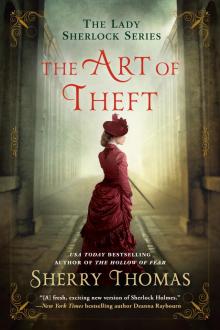 The Art of Theft
The Art of Theft The Magnolia Sword: A Ballad of Mulan
The Magnolia Sword: A Ballad of Mulan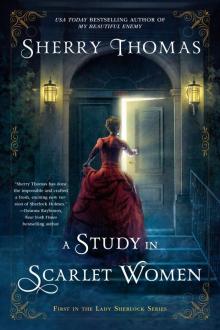 A Study In Scarlet Women
A Study In Scarlet Women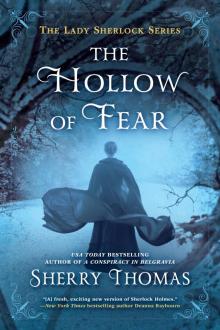 The Hollow of Fear
The Hollow of Fear The Magnolia Sword
The Magnolia Sword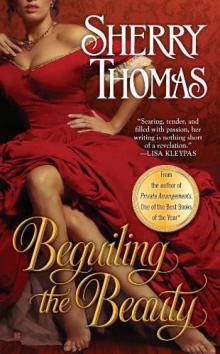 Beguiling the Beauty ft-1
Beguiling the Beauty ft-1 The Heart is a Universe
The Heart is a Universe The Hidden Blade: A Prequel to My Beautiful Enemy (Heart of Blade)
The Hidden Blade: A Prequel to My Beautiful Enemy (Heart of Blade)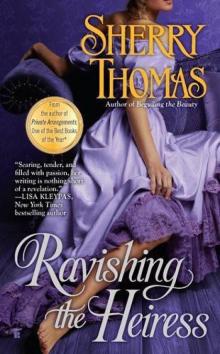 Ravishing the Heiress ft-2
Ravishing the Heiress ft-2 The Immortal Heights
The Immortal Heights The Hidden Blade
The Hidden Blade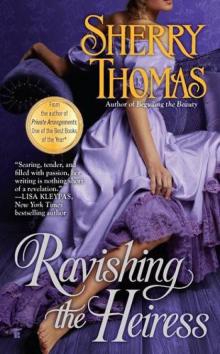 Ravishing the Heiress
Ravishing the Heiress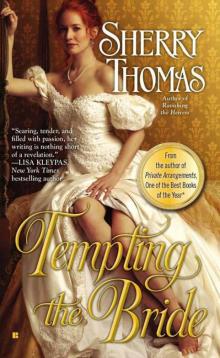 Tempting the Bride
Tempting the Bride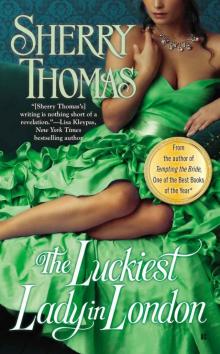 The Luckiest Lady in London
The Luckiest Lady in London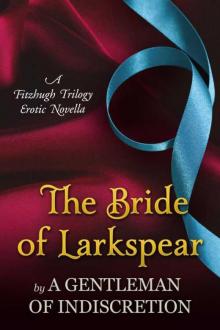 The Bride of Larkspear: A Fitzhugh Trilogy Erotic Novella
The Bride of Larkspear: A Fitzhugh Trilogy Erotic Novella Claiming the Duchess
Claiming the Duchess The One in My Heart
The One in My Heart His At Night
His At Night A Dance in Moonlight
A Dance in Moonlight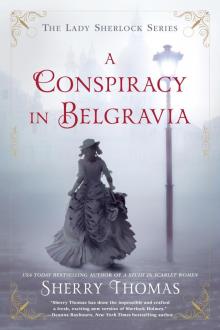 A Conspiracy in Belgravia
A Conspiracy in Belgravia Not Quite a Husband
Not Quite a Husband